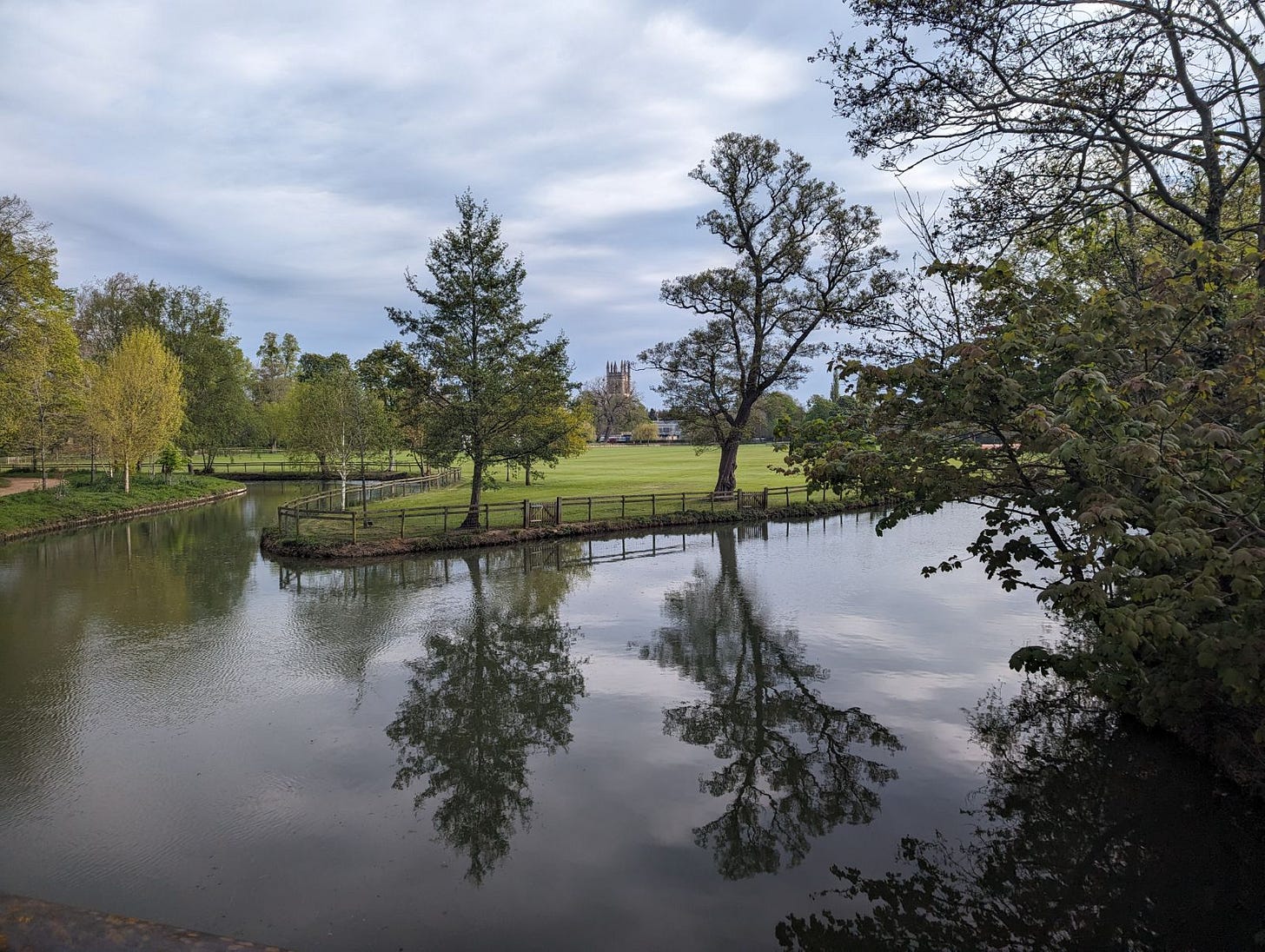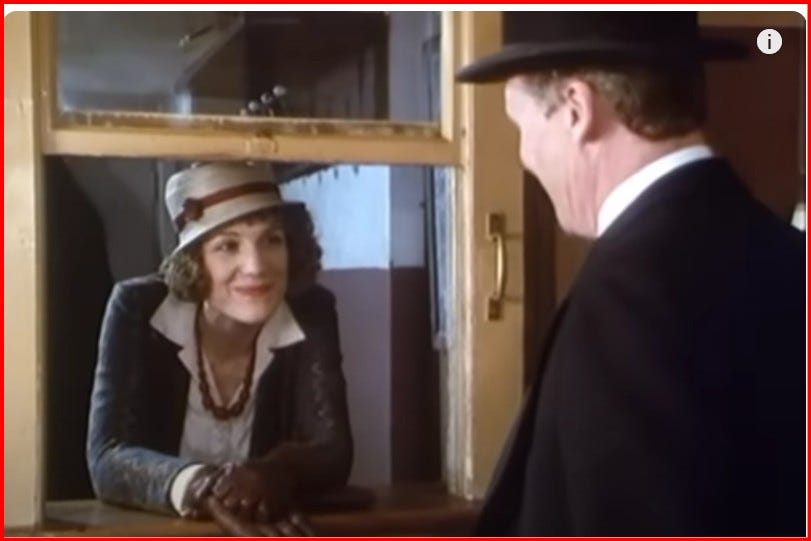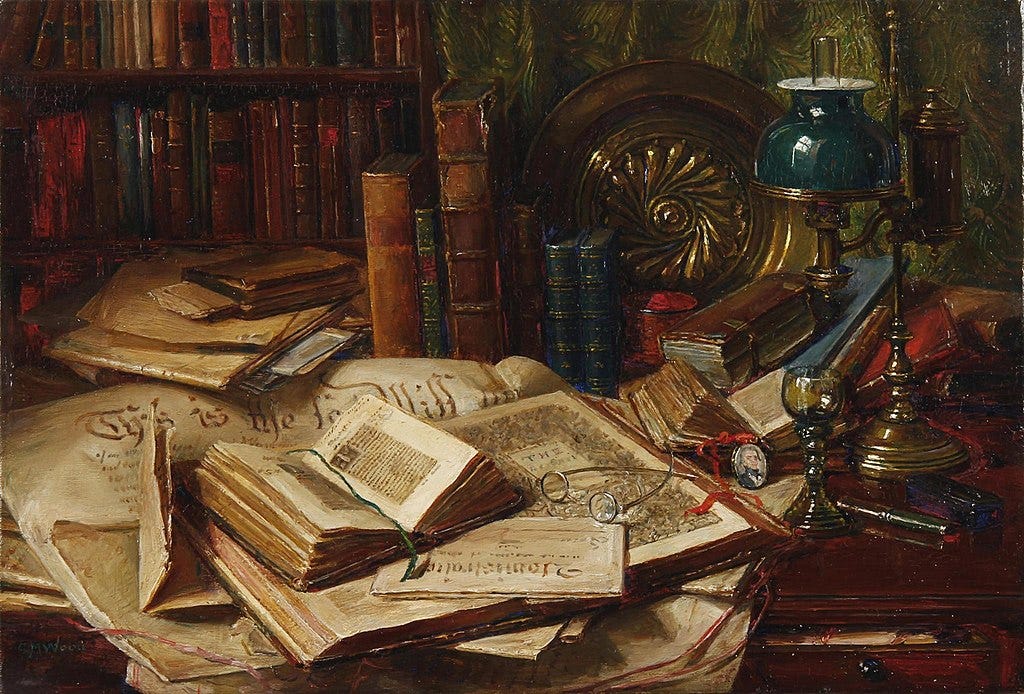
You’ll now find a new section on our Biblioll College home page navigation bar: Dreaming Spires, alongside Arts & Culture, The Great Books Reading Challenge, Library-Educated, and The Shadow Canon..
As you may remember from my About Biblioll College post, we purloined the title of our imaginary alma mater from Thomas Hardy’s Jude the Obscure because (like Jude) we scribblers here in Biblioll’s “SCR” (Senior Common Room) view Oxford as a shining “city on a hill” in the topography of our imaginations.
Okay, okay, so Oxford isn’t on a hill. Au contraire, it’s semi-sunk, like a great ocean liner run aground, between the confluence of two turbid rivers: the Thames and the Cherwell. This probably explains why our beloved city is prone to both flooding and soggy weather—the kind of damp that inspired Max Beerbohm (Merton College, 1890–1894), in his glittering and subversively funny Zuleika Dobson (to be discussed soon), to rhapsodize at length on the “miasma” of Oxford’s climate. Beerbohm uses the evocative word (a near-homonym for “my asthma”) as a sort of “objective correlative” (or is it a “pathetic fallacy”?) for what he proposed to enshrine, the naughty man, as “the spirit of Oxford.” (Et tu, Brute?!)
If I’m to be entirely honest, I suppose I must also grant that Oxford’s storied history, colorful traditions, and architectural splendors—Gothic arches, Narnian lampposts, and cloisters in Cotswold limestone, honeying with age…ah!—do not necessarily speak to the university’s current merits as a degree-conferring academic institution, whose mission is to prepare the brightest and best of young Britain (and the world) for a lifetime of personal and professional achievement. Etc. Still, the university has scored #1 nine years running on the Times Higher Education list and is in the top five of just about all the leading educational ranking systems in the world. Its famous (and no doubt spenny) tutorial system is the envy of Academe.
Either way, I confess I don’t envy all those bright-eyed (or four-eyed) young people toodling around on their bicycles through the cobblestoned streets of the city centre, sweating to get to their next lecture or exam or tutorial. Not a jot. Why? Because Oxford is also, I’ve been given to understand, a competitive, demanding, and perhaps unforgiving place, with a brutal testing system and a disturbing suicide rate. As one who never performed well under great stress—least of all in a test (oh that word)—I’ve come to believe, in my dotage, that it was just as well that I learned whatever it is I now claim to know by way of my own eccentric methods.

Be that as it may, I am now in a stage of life where it’s better to enjoy the many benefits and pleasures of Oxford from a comfortable remove, and share them with family, friends, and the odd Substack reader. (Another stream of income to help pay for a trip, or better yet, a small flat within walking distance of those Gothic spires, wouldn’t be intrinsically repugnant—did I mention Oxford is also spenny af, as the kids like to say?)
Posts in this new section will generally deal with one of the following related topics:

1. Oxford in Fiction and Film
There have been so many great books (and book series, and their screen adaptations) set in Oxford.
Of course there have been. Oxford, as a setting, could never be anything other than a leading character in its own right—like one of Bertie Wooster’s Formidable Ancient Aunts, who steals every scene she’s in. Besides Jude the Obscure and Zuleika Dobson, mentioned above, there’s arguably the greatest “Oxford novel” of all, Brideshead Revisited, and a whole host of others: from Newman’s Loss and Gain to Dorothy Sayers’ Gaudy Night; from Pullman’s His Dark Materials (which I haven’t read yet) to R.F. Kuang’s Babel; from the classic Inspector Morse series by Colin Dexter to newer entries in the detective genre, such as those written by M.S. Morris and Simon Mason.
There are even, I’m stunned to say, cat mysteries set in Oxford. Yes, this is a thing. And I shall have to read and report on at least one sometime in the near future.

2. The Lives and Works of Remarkable Oxonians
Oxford University is nine hundred years old. The town is even older. What that means for a writer such as myself is that once one’s Reticular Activating System has been triggered with “Oxford” as the point of reference, one is constantly bumping into the names and works of notable figures with some close connection to Oxford, whether Town or Gown. (I mean—Kris Kristofferson!? Yes, seriously! According to the fantastic Ken Burns Country Music documentary, Kristofferson’s reading of Poetry at Oxford is one of the reasons he was such a fine songwriter.) In Dreaming Spires we’ll be discussing the books and biographies and legacies of many a famous Oxonian here, from Duns Scotus to Percy Shelley, from William Morris to Max Beerbohm to Iris Murdoch. And maybe even Kris, too.

3. “Campus Novels” and “Dark Academia”
If Oxford’s been around for nine hundred years, “campus novels” have surely been around for eight hundred and fifty of them. Whether or no, we’ll also be using Dreaming Spires as an excuse for lolling about the quads of other literary campuses, real or imagined, including those which serve as settings for some of the so-called Dark Academia titles.
Yes, like cat mysteries, “Dark Academia” is also a thing—and a pretty sizeable thing, too, ever since some TikToker with 100K followers picked up Donna Tartt’s The Secret History during Covid and, inspired by all those posh classicists in their Hermès ties exclaiming Χαῖρε! as they dash around pitchforking locals, began posting atmospheric photos of leather-bound books, guttering candles, long-haired cats in repose, and dreamy freshers striking languid poses in cashmere and tweed.
Don’t mistake me, I adore The Secret History. It’s one of my Desert Island books. Definitely worth a post. My point is, it’s fascinating how “Dark Academia” (both as literary genre and “vibe”), reflecting as it does a deep nostalgia for the ivy-covered halls of an Academe that may no longer exist—if it ever did—took off during a worldwide lockdown and is thriving still in the middle of an unprecedented crisis for Higher Education.
I can’t predict that our discussions here on Dreaming Spires will throw any light on that subject (some D.Phil candidate’s soon-to-be dissertation topic, I’d wager, if it isn’t already), but we’ll at least have some good fun nosing around in the bibliography and marginalia.
4. Oxford: “Town and Gown”
Last year, Daniel and I spent a whole month in Oxford, while Rach and Boze held down the fort here in Oregon. It was the holiday we’d been praying for for decades, and it did not disappoint. If you’ve already clicked on the Dreaming Spires section on the navigation bar of our home page, you may have seen that there are already eight posts there from that 2024 trip, originally posted on another website and moved here (in anticipation of Dreaming Spires) when we began to set up this Substack in February, 2025.
To these eight posts will soon be added more, and probably quite a few Notes as well, as Daniel and I head back to Oxford in mid-May, 2025, for another four weeks. Our plan (besides daily walks all over the city, one of the most gloriously walkable in the world) is to attend public lectures at the Bod, concerts in churches and the Sheldonian, book talks at Blackwell’s, fish & chips at the best local pubs, and choral Evensongs at various college chapels. We will also take day trips to the Didcot Railway Centre, to the gorgeous Cotswold village of Chipping Campden for a music festival, to Salisbury Cathedral, and to London’s West End for a production of Terence Rattigan’s The Deep Blue Sea.
We’ll post as often as we’re able (both full-length posts and Notes), and will drop photos on my BlueSky, Pinterest, and Instagram accounts. I hope you will follow along!
So this is the mischief we’ll be getting up to under the rubric of Dreaming Spires, usually on Tuesdays. Also, before we leave for Oxford, I plan to drop at least one “Dreaming Spire” post of a bookish nature.
Until next Tuesday…Χαῖρε!




